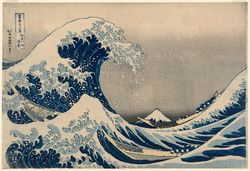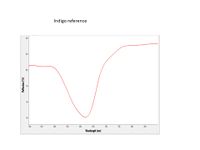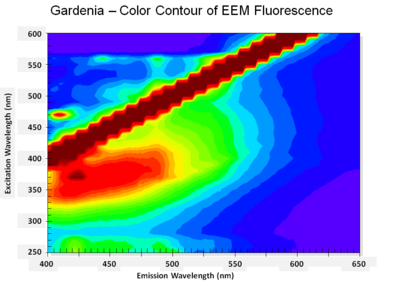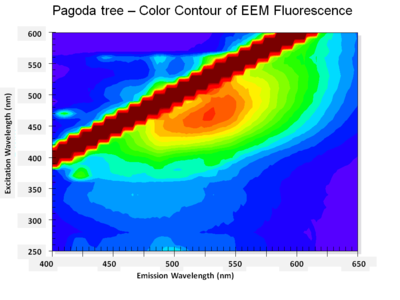Difference between revisions of "Category:Flavonoids: Ukiyo-e colorant"
| Line 2: | Line 2: | ||
[[File:SC130566.jpg|right|250px|link=https://collections.mfa.org/objects/234428/under-the-wave-off-kanagawa-kanagawaoki-namiura-also-kn?ctx=ed6b9b8b-e830-4c25-9793-ba7646059146&idx=3|Great Wave by Katsushika Hokusai]] | [[File:SC130566.jpg|right|250px|link=https://collections.mfa.org/objects/234428/under-the-wave-off-kanagawa-kanagawaoki-namiura-also-kn?ctx=ed6b9b8b-e830-4c25-9793-ba7646059146&idx=3|Great Wave by Katsushika Hokusai]] | ||
| − | <font size="3">'''[[Flavonoid|Flavonoids]]'''</font>: A group of organic colorant composed of heterocyclic aromatic compounds. For this database, a group of organic yellow colorants have been grouped | + | <font size="3">'''[[Flavonoid|Flavonoids]]'''</font>: A group of organic colorant composed of heterocyclic aromatic compounds. For this database, a group of organic yellow colorants have been grouped in this group, flavonoids due to this common chemical composition and difficulty in identifying them individually. Colorants that have been thought to have been traditionally used in ukiyo-e prints that fall in this category are: Gardenia or 梔子(''kuchinashi''), ''Miscanthus tinctorius'' grass plant or 苅安(''kariyasu''), Mountain peach or 山桃(''yamamomo''), Pagoda tree or 槐(''enju''), and Toringo crabapple or 棠梨(''zumi''). |
| − | Flavonoids have been detected. The | + | Flavonoids have been detected but with current analysis it is difficult to identify the exact source. The flavanoid yellow appear to be a duller tan compared to the vibrant turmeric and orpiment although this is unkown if it is its natural state or due to age and/or fading. |
'''For more information see:''' [[Flavonoid]], [[Gardenia]], [[Kariyasu]], [[Pagoda tree]], [[Zumi]] | '''For more information see:''' [[Flavonoid]], [[Gardenia]], [[Kariyasu]], [[Pagoda tree]], [[Zumi]] | ||
| Line 43: | Line 43: | ||
== Analysis == | == Analysis == | ||
| − | + | Flavonoids, such as pagoda tree and kariyasu fluoresce weakly under ultraviolet radiation and only have slight differences in their EEM plots (or spectra?). Due to the difficulty in distinguishing the flavonoid yellows, the decision was made to group them as flavonoids to minimize mistakes in identification. | |
<gallery mode="packed" heights="200px" style="text-align:left;"> | <gallery mode="packed" heights="200px" style="text-align:left;"> | ||
Gardenia color.PNG|<center>3D EEM plot for Gardenia</center> | Gardenia color.PNG|<center>3D EEM plot for Gardenia</center> | ||
Revision as of 15:55, 18 May 2020
Flavonoids: A group of organic colorant composed of heterocyclic aromatic compounds. For this database, a group of organic yellow colorants have been grouped in this group, flavonoids due to this common chemical composition and difficulty in identifying them individually. Colorants that have been thought to have been traditionally used in ukiyo-e prints that fall in this category are: Gardenia or 梔子(kuchinashi), Miscanthus tinctorius grass plant or 苅安(kariyasu), Mountain peach or 山桃(yamamomo), Pagoda tree or 槐(enju), and Toringo crabapple or 棠梨(zumi).
Flavonoids have been detected but with current analysis it is difficult to identify the exact source. The flavanoid yellow appear to be a duller tan compared to the vibrant turmeric and orpiment although this is unkown if it is its natural state or due to age and/or fading.
For more information see: Flavonoid, Gardenia, Kariyasu, Pagoda tree, Zumi
Examples of Flavonoids in Ukiyo-e Prints
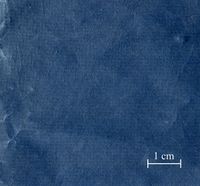
|

|

|

|

|
Analysis
Flavonoids, such as pagoda tree and kariyasu fluoresce weakly under ultraviolet radiation and only have slight differences in their EEM plots (or spectra?). Due to the difficulty in distinguishing the flavonoid yellows, the decision was made to group them as flavonoids to minimize mistakes in identification.
Other Images of Flavonoids
List of Prints
List of prints where indigo was detected
Pages in category "Flavonoids: Ukiyo-e colorant"
The following 51 pages are in this category, out of 51 total.
B
E
- Eisen, Kawasaki, No. 3 from an untitled series of the Fifty-three Stations of the Tôkaidô Road, 11.25617
- Eisen, Minazuru-hime as Ono no Komachi and Benkei as Kisen Hôshi, from the series Characters from the Life of Ushiwaka as the Six Poetic Immortals, 11.25669
- Eisen, The Song Evening Mist at Asama Peak, on Scrap-paper Fabric with an Itchû-bushi Libretto, from the series A Modern Pine Needle Collection, 11.17878
- Eishi, Shizuka of the Shizutamaya, from the series Beauties of the Yoshiwara as Six Floral Immortals, 53.21
- Eizan, Kashiku of the Tsuruya, from the series Array of Beauties of the Pleasure Quarters, 11.17716
F
H
- Harunobu, A Young Woman in a Summer Shower, 11.19430
- Harunobu, Courtesan and Kamuro Looking at the Face of a Komusô Reflected in a Mirror, 45.833
- Harunobu, Courtesan Reading a Letter by Moonlight Reflected on Snow; Parody of Son Kang, 11.19438
- Harunobu, Courtesan Riding a Carp and Reading a Letter; Parody of the Immortal Qin Gao, 06.969
- Harunobu, Courtesan Watching Two Kamuro Make a Snow Dog, 21.4463
- Harunobu, Kojima Bingo no Saburô Takanori, 11.19633
- Harunobu, Osen of the Kagiya and a Young Man with a Cat, 11.19496
- Harunobu, Parody of Saigyô Hôshi: Courtesan Looking at a Screen Painting of Mount Fuji, 11.19431
- Harunobu, Poem by Saigyô Hôshi, from an untitled series of Three Evening Poems, 34.348
- Harunobu, The Sake Cup, sheet 4 of the series Marriage in Brocade Prints, the Carriage of the Virtuous Woman, known as the Marriage series, 11.19475
- Hiroshige I, Naitô Shinjuku, Yotsuya, from the series One Hundred Famous Views of Edo, 11.35823
- Hokkei, Goat Standing by a Plum Tree, 21.9277
- Hokkei, Ômori, from the series Souvenirs of Enoshima, a Set of Sixteen, 11.19845
K
- Kiyomasu I, Courtesan Reading a Poem, 28.198
- Kiyomasu II, Actors Segawa Kikunojô I as Yomogiu, Ichikawa Ebizô II as Tono no Hyôe, and Yamamoto Kyôzô as Kureha, 21.5459
- Kiyomasu II, Actors Ôtani Hiroji II as Washi no Chôkichi and Arashi Tominosuke as Tarui Osen, 21.5458
- Kiyomitsu I, Actor Ichikawa Yaozô I as Soga no Gorô Tokimune, 06.401
- Kiyomitsu I, Actor Segawa Kikunojô II as Itsuki, 11.19020
- Kiyomitsu I, Actor Segawa Kikunojô II as Seryômura Okiku, 11.18992
- Kiyomitsu I, Yoritomo's Hunt at the Foot of Mount Fuji, 11.19694
- Kiyonaga, The Brine Maidens, from the series Current Manners in Eastern Brocade, 11.13880
- Kokan, Couple Cooling Off on a Garden Bench, 11.19524
- Koryusai, Descending Geese at Mimeguri, from the series Fashionable Eight Views of Edo, 11.14627
- Kunisada, Poem by Ariwara no Narihira Ason: (Actor Ichikawa Danjûrô VIII as) Seigen, from the series Comparisons for Thirty-six Selected Poems, 11.42663
- Kunisada, Young Woman Pointing and Giggling, from the series Types of the Floating World Seen through a Physiognomist's Glass, 34.471
- Kuniyoshi, Actor Ichikawa Kodanji IV as the Ghost of Asakura Tôgo, 11.30460
- Kuniyoshi, Takeout Sushi Suggesting Ataka, from the series Women in Benkei-checked Fabrics, 11.36360
- Kuniyoshi, Tsumagome: Abe no Yasuna and the Fox Kuzunoha, from the series Sixty-nine Stations of the Kisokaidô Road, 11.41803
M
S
- Sharaku, Actor Osagawa Tsuneyo II as Ippei's Older Sister Osan, 11.14673
- Sharaku, Actor Osagawa Tsuneyo II as Ippei's Older Sister Osan, 11.14674
- Sharaku, Actor Osagawa Tsuneyo II as Ippei's Older Sister Osan, 21.7244
- Shinsai, Chapters 25–27, from the series The Tale of Genji, 21.9264
- Shunshō, Actor Segawa Kikunojô III as Shirokiya Okoma, from the series Fans of the East, 11.14871
- Shunshō, No. 6, Cui Zongzhi (Saisôshi), from the series Eight Immortals of The Wine Cup, 11.14847
T
- Toshinobu, Actors Matsushima Hyôtarô as the Courtesan Senzai and Nakamura Ujûrô and Nanboku Magotarô as Samurai, 11.13225
- Toyoharu, A Fashionable Picture of Wada's Banquet, from the series Scenes of Japan in Perspective Pictures, 54.1499
- Toyokuni, Actor Arashi Kitsusaburô I as the Monkey Trainer Yojirô, in the Horikawa Scene of the Play Oshun and Denbei, 11.30331
